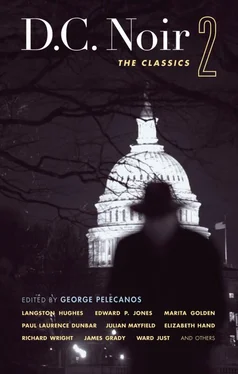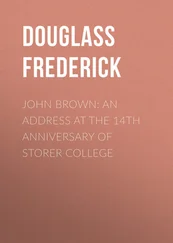Nobody ever seemed to care what had happened to the students, waiters, car washers, pensioners and the professional tire changers.
Mush parked the car in the circular driveway where it said no parking and we rode the elevator up to the eighth floor.
“Fredl will be glad to see you,” I told Padillo. “She might even invite you to dinner.” I opened the door. The light from one large lamp burned in the livingroom, but the lamp had been knocked to the floor and the shade was lying a foot or so away. I went over and picked up the lamp, put it on the table, and replaced the shade. I looked in the bedrooms, but that seemed a foolish thing to do. She wasn’t there. I walked back into the livingroom and Padillo was standing near the record player, holding a piece of paper in his right hand. Mush stood by the door.
“A note,” I said.
“A note,” he agreed.
“But not from Fredl.”
“No. It’s from whoever took her away.”
“A ransom note,” I said. I didn’t want to read it.
“Sort of.”
“How much do they want?”
Padillo saw that I didn’t want to read the note. He put it down on the coffee table.
“Not much,” he said. “Just me.”
Reflecting
by Rhozier “Roach” Brown
(Written in 1969)
Lorton, VA
Two hands resting on bars of steel
Wondering was all this really real
Living from day to day using dope
Death was waiting with a steel rope.
Living a life I thought was pretty cool
Moving in a hurry and breaking all the rules
Stepping on anyone who got in my way
Never expecting any dues to pay.
I was hooked quite early, and dying quick
Staying high and fly, and pretty slick
The world passed by and I was in a deep nod
To awake a young old man and find no God.
Wine and reefers were a part of my song
Getting my kicks and doing wrong
It’s a miracle, how I managed to survive
Riding a pale white horse, bent on suicide.
Her eyes are moist, bursting from within
Alone and crushed, her man in the pen
Patiently she tried and done all she could
It didn’t work, it just wasn’t any good.
I killed all the love that stood in my path
Love was for suckers, and I was in a Hip Bag
If only I had listened, or even cared
My youth and dreams, wouldn’t die in here.
I knew all the angles, and how to score
But all it’s brought me was time and a steel door.
A few days of fun and years of pain
Is the price I pay for doing my thing.
Now I hurt in a way I’ve never known
For the rest of my life, I’ll be alone.
Here in the House of Time, grown men cry
I, too, am one of them and I know why
My brand of cigarettes tells of a hip young fool
Who destroyed his life and family being real KOOL.
(Originally published in 1971)
Connecticut Avenue
Nora believed that my stories were old-fashioned. She said once, “Friend, why don’t you write something up-to-date, immediate. The romantics are dead. Friend, they’re gone .” She was really very serious about it, and I had to tell her that hers was a liverish idea whose time had not yet come. Not that it made any difference, because in 1965 nobody would buy the stories except an obscure review in the Midwest, whose payment was in prestige. In the first six months of 1965 I had two payments of prestige with a third on the way. For eats, as Nora liked to call them, I worked as a researcher for Congressional Weekly Digest , an expensive private newsletter which purported to give its subscribers advance information on legislation pending before the House and Senate. I was paid a hundred dollars a week for reading the Congressional Record and reporting my findings to the editor, who would rearrange them into breathless verbless sentences.
But that had little to do with Nora Bryant. She was English and had come to Washington as correspondent for one of the popular London dailies. She had good looks, and good brains to go with the good looks, but she was admired for her idiosyncrasies. Nora believed that America was alive and Britain was dead; interesting, amusing in its way, but dead nonetheless. She thought that this country was open to possibilities and in perpetual motion in a way that Britain was not. She had a wide circle of American friends, and spent as little time at the British embassy as she could manage; the ambassador there was an aging peer whom she called the kandy-kolored tangerine-flake stream-lined baron. In a bewitching West Riding accent she spoke American slang, and the effect was hilarious: Somerset Maugham imitating Allen Ginsberg. Her specialty was southern politicians and she told me it was a high point of her life here when she spent an evening with the then-occupant of the White House and came away with enough vocabulary to last her a month or more. She came to my apartment after dinner at the White House, still laughing over all the wonderful words and phrases she’d learned. I tried to pump her about the man himself, what he was like. How much did he drink? What was on his mind? Was his mood hot or cold?
“I didn’t have a thermometer up his bum, friend,” she said.
“Come on, Nora! Give! What did he say about the war? Anything about—”
She laughed and shook her head.
“Nora …”
“That dog won’t hunt,” she said, and that was that.
We’d met at a party on Capitol Hill, and I was quickly taken with her because she asked me about my stories. Under any normal circumstance a writer doesn’t like to be asked what he’s working on, except in Washington no one cared at all. No one ever asked me about my fiction, so my identity was frozen at “researcher for Congressional Weekly Digest ,” a job I despised and was defensive about. Nora understood right away. She was persistent in asking about the stories and it was clear to me as I answered her that I hadn’t thought them out clearly. She saw this, too, but did not press it. She told me to keep working, and everything would be fine.
“You’ll be jake,” she said. “You’re a writer, I can see that.”
“Oh? Just how?”
“You don’t know what you think.”
Nora is barely five feet tall, and I come in at just under six feet four. In a brief moment of anger I saw her as a little girl who worked for a second-string London newspaper, looking up at me and figuratively patting me on my head; the patronage was unmistakable and outrageous, but I was charmed. At our first meeting, listening to her voice and watching her glide around the room, I fell half in love with her. She seemed wonderfully cheerful and inquisitive, intelligent and sure of herself, and I liked the attention. It was a large, jumbled party and she left it early, and two days later called me at my apartment.
“I’ve got a pretty good tip,” she said. “Will that do you any good at that thing you work for? That newsletter?” She sounded brisk and impatient.
“Sure,” I said. Gottschault, the editor, paid me a ten-dollar bonus for any authentic inside story, anything that had not been printed elsewhere. I had never taken advantage of this, because I seldom read the newspapers and therefore did not know what was news and what wasn’t.
“All right,” she said. “The Senate Finance Committee will take up the oil section of the tax bill on Thursday. They will report it on Friday. There will be one day of discussion, in private. No more.”
“Thursday, huh?”
“Yes, Thursday. Now does that suggest anything to you?”
“No,” I said.
“Well, today is Wednesday. That might suggest to you that the oil section has already been written .”
Читать дальше











